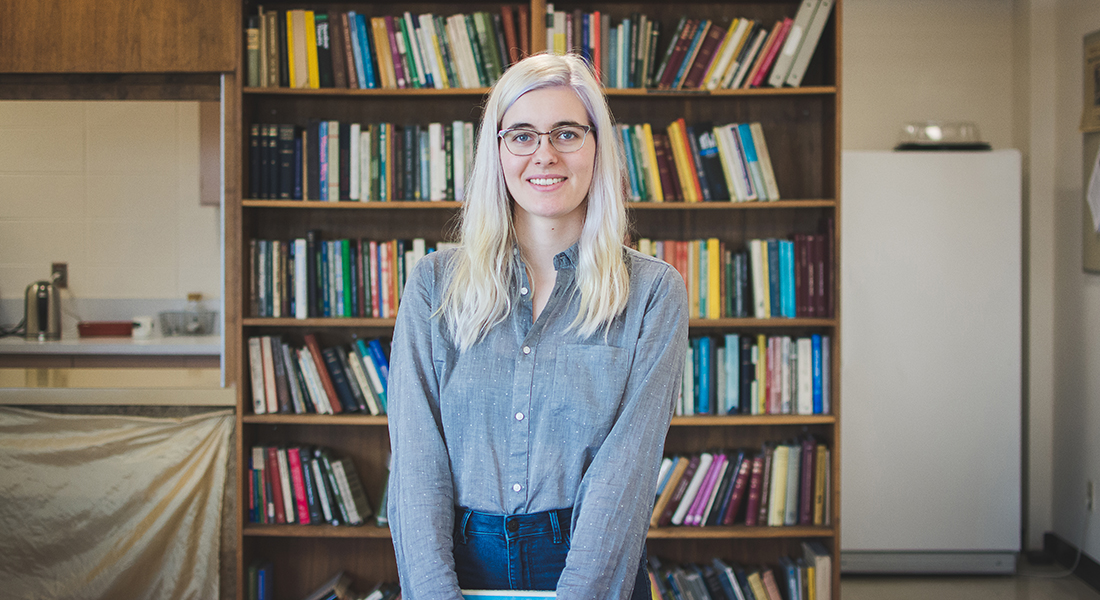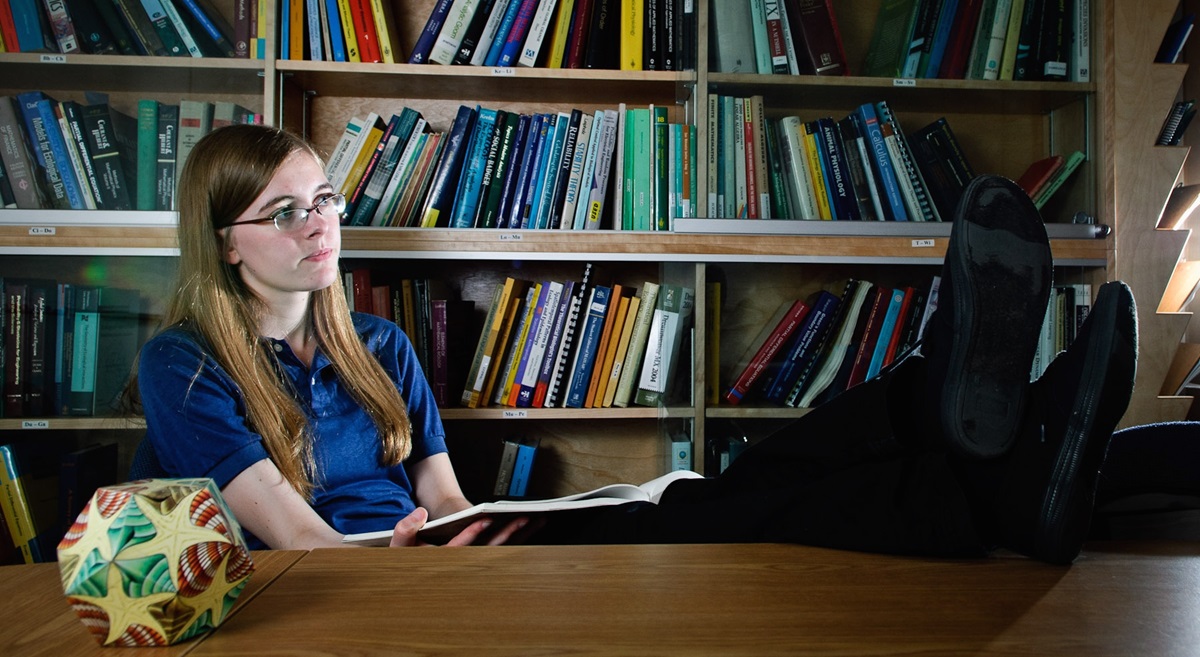
In her fourth year, Emma McDonald was elected president of Ada's Team-a student group encouraging diversity in computing, games, and technology.
While planning her science degree, Emma McDonald made the ambitious decision to pursue a double major in Mathematics and Computing Science-two historically male-dominated fields. We asked Emma to share a little bit about her experience as a UAlberta student and a representative of women in STEM, and if she had any advice for future students.
How did you first come to be interested in Math and Computing Science?
I liked math in high school, but I didn't realize it was something I could pursue any further. I applied for the WISEST Summer Research Program when I was in Grade 11 and I was lucky enough to be placed in the Department of Mathematical and Statistical Sciences, under the supervision of Gerda de Vries and Hannah McKenzie. I spent the summer working on making mathematics workshops for a secondary-school audience, which is when I really fell in love with math. My supervisor let me pick my own topic to focus on and I chose graph theory (which I study to this day). Working on my project for the summer made me dazzlingly happy, so when I applied to the University of Alberta the next year, I applied to study math.
Getting involved in computing science was another happy accident. As someone who had grown up without Internet at times, I had very little experience with computers. A good friend of mine recommended I take some intro computing courses because they would be useful to me as a mathematician. I took their advice and ended up loving computing science as well and deciding to learn more.
What motivated you to pursue a double major?
I knew some people who were taking after degrees in computing science. I initially wanted to do that as well, but I needed a minor to finish my math degree first. I didn't want to take courses in anything other than math or computing science, and I wanted to take more CS courses than a minor allowed, so a double major seemed to make the most sense.

Emma McDonald, pictured here as a high school student on campus during her experience with the WISEST Summer Research Program.
What role has WISEST played in your post-secondary journey?
WISEST gave me two important things before I even started my post-secondary journey: a subject area I knew I wanted to study and an awareness of the community advocating for diversity in STEM fields. The mentorship and encouragement I received from my involvement with the WISEST Summer Research Program was hugely important to me. I knew I wanted to provide that for others.
WISEST has also been a bit of a touchstone for me throughout my degree. I have volunteered with WISEST's conferences and events throughout my degree, and every year I get to bring new experience and confidence to my mentorship role. I can chart my growth as a leader through my involvement with WISEST over the past six years.
Tell us about your work with Ada's Team-how did you get involved?
Ada's Team is a student group that encourages diversity in computing, games, and technology. We support diversity in all its forms, including gender, race and ethnicity, ability, sexuality, age, and status. Ada's Team hosts events, organizes tutoring, sends students to conferences, and provides a safe, positive space on campus. We're a voice for diversity and inclusivity in the Department of Computing Science.
I got involved with Ada's Team in my fourth year, after working with Sarah Beck, one of the founders of Ada's Team, during the summer. I was elected president for the following year. My executive and I sent students to the Canadian Celebration of Women in Computing, which took place in Ottawa, and we hosted a very successful panel at that conference. We ran a number of social events for students to work on homework together and we hosted 100 hours of free tutoring for students in introductory computing courses.
"Math and computing science may sometimes look scary from the outside, but they are just as approachable and interesting and fun as any other science or art. Struggle doesn't equal failure."-Emma McDonald
Let's talk a bit about your time as a summer camp leader. Why do you feel it is important to advocate for science at a young age?
I've worked for a number of outreach initiatives at the University of Alberta. I taught the Faculty of Science's computing science summer camps and I ran one of DiscoverE's Girls Coding Clubs for a while. I think advocating for science at a young age is so important because it's so easy to become alienated by a subject in your youth and then avoid it as you grow. It's heartbreaking to see people who are convinced they'll never understand science or that they hate math or that they'll never be able to code. I always tell them that somebody has let them down if they've never had a good experience with these subjects, because science and math can be hugely exciting and interesting and approachable. Beyond that, science and math tend to lack diversity. I know how important role models and mentorship are for preventing minorities from being pushed out of STEM fields, so I want to do as much as I can to contribute to the safety and comfort of diverse voices.
I do a lot of outreach focused on computing science in particular, because computers are such a big part of our world and our society. Not allowing women and people of colour and other underrepresented groups to be a part of math and CS is basically denying them access to how our world works, which is unbelievably dangerous for our society and for marginalized demographics. Advocating for science at a young age lets you start working to counteract the voices that tell kids, especially young women, that they can't be scientists, before the irrevocable damage is done.
What advice do you have for students following in your footsteps?
Don't be intimidated by these fields. Math and computing science may sometimes look scary from the outside, but they are just as approachable and interesting and fun as any other science or art. Struggle doesn't equal failure. Don't be intimidated by terminology you don't understand. Don't be afraid to ask for help. Everyone learns differently and works differently and the amount of work you have to do to solve a problem doesn't have to be the same as the amount of work someone else does. Find a community. There are people who want you to succeed. I'm one of them.
What are some of your highlights from your time at the U of A?
One of the biggest highlights of my degree is the 2015 Canadian Undergraduate Mathematics Conference (CUMC). I planned and hosted the 22nd annual CUMC, taking place at the University of Alberta in June 2015. It was a huge undertaking that resulted in 120 students from across Canada coming to the university for a week to learn and share math. Running registration for my conference and watching all those students trek through CAB, here because I planned a conference and invited them, is a top moment of my degree.
Another big highlight is being a TA in the computing science department. I treasure each time a student has told me that I helped them understand a concept or made the subject less daunting.
Finally, one of the most important parts of my degree has been Ada's Team. Ada's Team allowed me many wonderful opportunities that I wouldn't have had access to otherwise, such as attending the Grace Hopper Celebration in Phoenix, Arizona, but, most importantly, Ada's Team gave me a community. As a gender minority in my field, I am often harassed, belittled, and dismissed. Having people that stand by you when you're going through things like that is invaluable. My involvement provided me with friends and mentors, and it helped me grow as a leader, a feminist, and a computer scientist. I am very proud to have contributed to Ada's Team during my degree. While I have many important memories associated with Ada's Team, such as hosting a panel at a CS conference in Ottawa or running an Arduino workshop with a roomful of excited grade 6 girls and watching them understand a program, some of the most important memories are of sitting in Ada's Base in the computing science building and talking to other women in the department about our experiences in tech.
What is next on your horizon?
I'm continuing my involvement with CMPUT 174, one of the introductory computing science courses at the U of A. I'm TAing in the spring term and working on the development of the course. In the later months of the summer, I'll be one of the supervisors for a group of WISEST summer research students working in the CS department, which feels like a nice way to come full circle as I close out my degree.